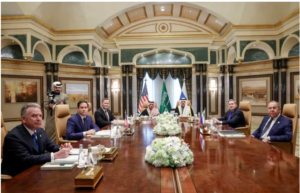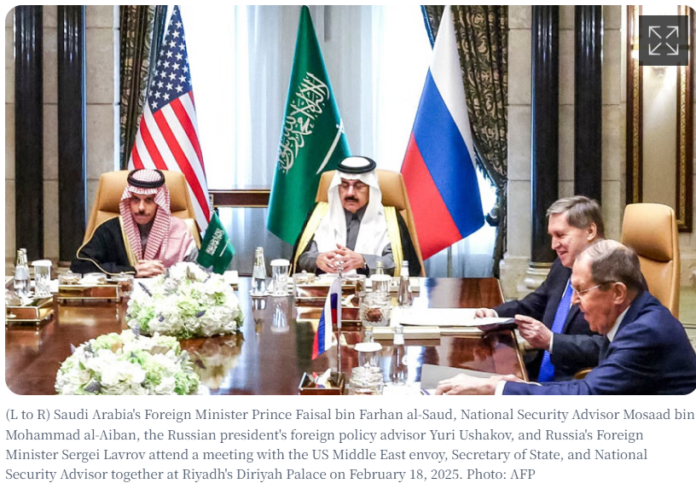By Joke Kujenya
A DIPLOMATIC breakthrough in the Ukraine war talks took shape on Tuesday as top United States and Russian officials met in Saudi Arabia, marking the first direct engagement between Washington and Moscow since the 2022 invasion.
However, the absence of Ukrainian representatives has raised concerns across Europe.
The high-level discussions in Riyadh resulted in an agreement to establish teams to explore pathways toward ending the war, though key details remain uncertain.
European leaders fear the talks could reshape regional security dynamics without their input.
US Secretary of State Marco Rubio and Russian Foreign Minister Sergei Lavrov agreed to appoint negotiation teams and set up a consultation mechanism aimed at addressing diplomatic tensions.
The State Department stated that the objective is to bring the war to a “fair, enduring, and sustainable” conclusion.
Despite this, the meeting yielded no specifics on a potential summit between US President Donald Trump and Russian President Vladimir Putin, leaving speculation over future engagements open-ended.
European leaders have reacted with unease, concerned that Washington’s shifting stance on Russia under the Trump administration could result in major concessions to Moscow.
Some officials said they worry that the negotiations could lead to a Cold War-style division of influence, potentially undermining Ukraine’s sovereignty and European security arrangements.
French President Emmanuel Macron convened an emergency meeting in Paris on Monday, but the discussions failed to produce a unified European stance.
Rubio acknowledged the necessity of European involvement, stating that EU nations would eventually need a seat at the negotiating table due to their role in enforcing sanctions on Russia.
“There are other parties that have sanctions; the European Union will have to be at the table at some point,” he remarked after the meeting.
However, European officials fear that any framework negotiated without their direct participation could be imposed upon them with little room for amendments.

Russia provided limited insight into the next steps, with Kremlin spokesperson Dmitry Peskov reiterating Moscow’s long-standing demand for a reconfiguration of Europe’s security architecture.
“A lasting and long-term viable resolution is impossible without a comprehensive consideration of security issues on the continent,” Peskov told reporters.
Russian officials have repeatedly called for the withdrawal of NATO forces from Eastern Europe, a demand Western nations have consistently rejected.
Ukrainian President Volodymyr Zelensky sharply criticised the talks, arguing that any effort to resolve the war must involve Ukraine.
Speaking after a lengthy discussion with Turkish President Recep Tayyip Erdogan in Ankara, Zelensky insisted that “Ukraine, Europe—including the EU, Turkey, and the UK—must be involved in conversations about security guarantees.”
The Ukrainian leader further stressed that no agreement could be considered legitimate without Kyiv’s participation.
The diplomatic encounter in Riyadh also touched on broader US-Russia relations, with both sides agreeing to pursue avenues for economic cooperation and a gradual restoration of diplomatic staffing levels.
Lavrov described the talks as “very useful” and emphasised that both nations “listened and heard each other.”
Trump’s National Security Adviser Michael Waltz and Middle East Envoy Steven Witkoff participated in the meeting, alongside Lavrov and Putin’s foreign affairs adviser, Yuri Ushakov.
Despite the diplomatic overtures, tensions between the US and Russia remain at their highest levels in decades, exacerbated by economic sanctions, military confrontations, and deep political distrust.
The meeting in Riyadh represents the most substantial contact between Washington and Moscow since the start of the war, but it remains unclear whether it will translate into meaningful progress.
While both sides have committed to ongoing discussions, the exclusion of Ukraine and European nations from initial negotiations raises doubts over the viability of any eventual settlement.





